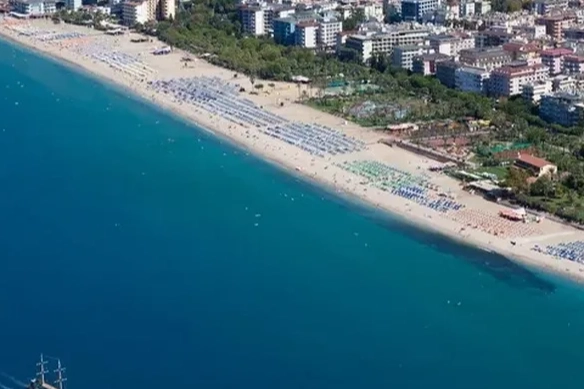Mersin Commodity Exchange President Abdullah Özdemir Calls for Reform in Government Policies Inspired by Netherlands' Agricultural and Food Export Success Abdullah Özdemir, President of the Mersin Commodity Exchange, called for a reassessment of government policies by taking inspiration from the Netherlands' success in agricultural and food exports. Özdemir emphasized Mersin's potential for growth in the agriculture and food sector and highlighted that it could become a significant region for Turkey.

Mersin Commodity Exchange President Abdullah Özdemir: "Mersin Could Be a Small Netherlands"
Abdullah Özdemir, President of the Mersin Commodity Exchange, called for the government to reshape its agricultural and food policies based on the success of the Netherlands in agricultural and food exports. Özdemir highlighted that Mersin has significant potential for development in the agriculture and food sector and could be an important region for Turkey.
Özdemir noted that while approximately 40% of the world's $2.1 trillion agricultural exports are carried out by EU countries, the Netherlands leads EU countries with $127 billion in exports. "We can consider Mersin as a small Netherlands. Our government could reshape its agricultural and food policies based on the Dutch model and declare Mersin as a pilot region to implement these policies," he said.
In his written statement, Özdemir pointed out that Turkey ranks first in Europe and ninth in the world with a $68.5 billion agricultural gross output, while Mersin plays a significant role in Turkey's agriculture and food sector. He stated that the city ranks third in plant production value, fourth in agricultural exports, and fifth in agricultural gross output. According to special trade system data, approximately 70% of Mersin's exports consist of agricultural and food products.
Özdemir emphasized that both Turkey and Mersin have considerable potential for further development in the agriculture and food sector and that the Dutch example should be carefully analyzed. He noted that, according to International Trade Centre statistics, the Netherlands is the third largest exporter of agricultural products after the United States and Brazil. "However, the true significance of the Netherlands' success lies in its ability to achieve this performance with agricultural land 230 times smaller than that of the U.S. and 125 times smaller than Brazil. While Turkey's agricultural exports total $31 billion, the Netherlands, with only one-nineteenth of Turkey's land area and one-twenty-first of its agricultural land, exports $127 billion. This figure is more than four times Turkey's agricultural and food exports," he said.
"Netherlands Leads in EU Agricultural Exports"
Özdemir highlighted that while EU countries are responsible for approximately 40% of the world's $2.1 trillion agricultural exports, the Netherlands leads EU countries with $127 billion in exports. He pointed out that 66% of the Netherlands' agricultural exports are from domestically produced products, while 34% come from transit exports.
Özdemir explained that the success of the Netherlands, where 66% of the land is used for agriculture, with an average farm size of 32 hectares and about 51,000 farms, is based on its strategy of converting imported raw materials into processed products and marketing these value-added products. "The Netherlands has $84 billion in agricultural and food imports against its $127 billion in exports. The difference reflects the advanced capacity of the Netherlands to create value-added products," he stated.
"Mersin Could Be a Small Netherlands"
Özdemir noted the significant role of public-private sector-university collaboration in the Netherlands' success, stating, "This tripartite collaboration ensures a more productive and efficient agriculture and food sector. The Food Valley region, which includes international food companies, research institutes, Wageningen University, and Research Center, is the center of this collaboration. This region is crucial for spreading technological innovations in industry and serves as a dynamic information hub for the agriculture and food sector. Mersin, with a land area equivalent to about 40% of the Netherlands, ranks first in Turkey for the production of 10 products and among the top three for 30 products. With its free zone, customs warehouses, organized industrial zones, port, and logistics facilities, we can view Mersin as a small Netherlands. Our government can reshape its agricultural and food policies based on the Dutch model and declare Mersin as a pilot region to start implementing these policies. We should establish mechanisms to convert imported raw materials into high-value-added processed products in addition to our strong domestic products. Thus, we can increase our volume in both direct exports of our products and transit exports of imported products. We expect the government to take steps to ensure this transformation and to organize relevant incentives and supports accordingly. The necessary infrastructure, workforce, and trade culture are abundantly available in our province. If supported by public-private sector-university collaboration, Mersin could become Turkey's agriculture and food hub."
Özdemir emphasized that their goal is to take a more active role in the agriculture and food sector, which is the industry of the future. "If this model succeeds as a pilot region in Mersin, it could be expanded to other regions in Turkey that are suitable for this model. Thus, we can enhance our strong position in agricultural gross output, currently ranked 21st in export rankings, by significantly increasing our agricultural exports," he concluded.